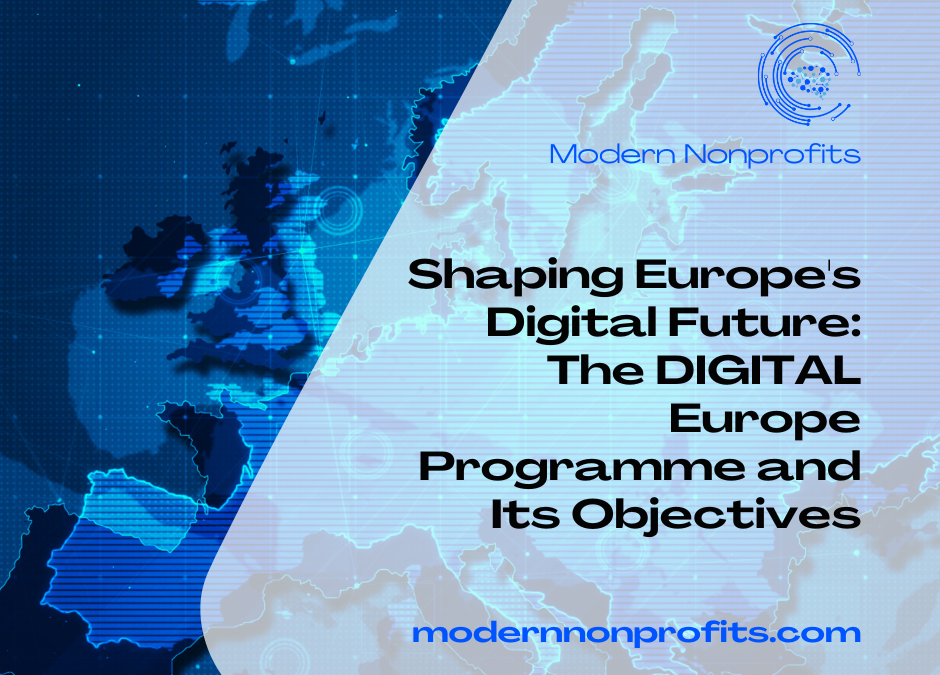The digital revolution has transformed the world in countless ways, and Europe is no exception. As technology continues to advance at a breakneck pace, it is essential for European leaders to take an active role in shaping the continent’s digital future. From artificial intelligence to cybersecurity, there are numerous areas where Europe can make a significant impact and ensure that its citizens benefit from the digital revolution.
One of the most important areas where Europe must take action is in the realm of digital innovation. The European Union has set a goal of becoming a world leader in digital innovation by 2030, and to achieve this, it is crucial to invest in research and development. This investment will not only help drive economic growth, but it will also ensure that Europe remains competitive on the global stage. To this end, the EU has established a Digital Innovation Hub, which provides support to start-ups, SMEs, and other organizations seeking to develop digital technologies.

Another area where Europe must focus its efforts is in the realm of data protection and privacy. With the increasing amount of personal data being collected by companies and governments, it is essential that Europe sets high standards for data protection and privacy. The EU’s General Data Protection Regulation (GDPR), which came into effect in 2018, is a significant step in this direction. It provides citizens with greater control over their personal data and imposes strict penalties on companies that fail to comply with its provisions. However, there is still much work to be done to ensure that Europe remains at the forefront of data protection and privacy.
In addition to data protection, Europe must also address the issue of cybersecurity. Cyberattacks are becoming increasingly frequent and sophisticated, and Europe must take steps to protect its critical infrastructure and institutions. This includes investing in cybersecurity research and development, increasing cooperation between member states, and ensuring that all organizations have robust cybersecurity protocols in place. The EU’s Cybersecurity Act, which was adopted in 2019, is a significant step in this direction. It establishes a framework for EU-wide cybersecurity certification and strengthens the mandate of the European Union Agency for Cybersecurity.

Artificial intelligence (AI) is another area where Europe has a significant role to play. AI has the potential to transform numerous industries, from healthcare to transportation. However, there are also concerns about the impact of AI on jobs and society as a whole. To address these concerns, Europe must take a balanced approach to AI, focusing on both innovation and regulation. The EU has established the High-Level Expert Group on AI to provide recommendations on how to approach the development and deployment of AI.
Finally, Europe must ensure that its citizens have access to the digital technologies they need to succeed in the modern world. This includes ensuring that everyone has access to high-speed internet, regardless of where they live. The EU’s Connecting Europe Facility aims to achieve this by investing in broadband infrastructure across Europe. In addition, Europe must also address the issue of digital skills. As the economy becomes increasingly digitized, it is essential that citizens have the skills they need to succeed in the workforce. The EU’s Digital Skills and Jobs Coalition is working to address this issue by providing training and education programs.
In conclusion, shaping Europe’s digital future is a complex and multifaceted task. From data protection to cybersecurity, there are numerous areas where Europe must take action to ensure that its citizens benefit from the digital revolution. By investing in research and development, setting high standards for data protection and privacy, addressing cybersecurity concerns, taking a balanced approach to AI, and ensuring that everyone has access to digital technologies and skills, Europe can become a world leader in digital innovation.

The DIGITAL Europe programme
The DIGITAL Europe programme is a key initiative of the European Union aimed at strengthening the European digital industry and fostering innovation in the digital sector. The programme is part of the EU’s overall strategy to ensure that Europe remains competitive in the global digital economy and continues to lead the way in digital innovation.
The DIGITAL Europe programme was proposed by the European Commission in 2018 and was officially adopted by the European Parliament and Council in April 2021. The programme has a budget of €7.6 billion and will run from 2021 to 2027.

The programme is focused on three main objectives:
- Building strategic digital capacities: This objective aims to strengthen Europe’s digital capacities in key areas such as artificial intelligence (AI), cybersecurity, and advanced digital skills. The programme will invest in research and innovation projects that can help Europe become a world leader in these fields.
- Deploying digital solutions across the economy and society: This objective aims to support the deployment of digital solutions across various sectors of the economy, including industry, healthcare, and public services. The programme will provide funding for pilot projects that can demonstrate the potential of digital solutions to improve efficiency and productivity.
- Ensuring a human-centric digital transition: This objective aims to ensure that the digital transition is inclusive and benefits everyone in society. The programme will support initiatives that promote digital literacy and skills, as well as measures to address the digital divide and ensure that vulnerable groups are not left behind.
The DIGITAL Europe programme will be implemented through a range of funding mechanisms, including grants, loans, and equity investments. It will also build on existing EU initiatives, such as the Horizon Europe programme and the European Digital Innovation Hubs.
Overall, the DIGITAL Europe programme is a significant investment in Europe’s digital future. By focusing on key areas such as AI, cybersecurity, and digital skills, the programme aims to ensure that Europe remains at the forefront of digital innovation and can compete on the global stage. It also aims to ensure that the benefits of the digital transition are shared by all in society and that no one is left behind.

The DIGITAL Europe Programme – Work Programmes
Overall objectives, scope, outcomes and deliverables as well as budget allocations, for each topic are described in the work programmes. On this web page you will find relevant documents and amendments for the work programmes once they have been adopted by the European Commission.
The current work programmes implementing DIGITAL are:
- DIGITAL Europe Work Programme 2021-2022 (.pdf)
- DIGITAL Europe – EDIH Work Programme 2021-2023 (.pdf), specifically dedicated to the European Digital Innovation Hubs
- DIGITAL Europe – Cybersecurity Work Programme 2021-2022 (.pdf)
- DIGITAL EUROPE – High Performance Computing (managed by the EuroHPC Joint Undertaking) : Decision No 40/2022 – Work Programme and Budget 2023 (.pdf)

Conclusion
In conclusion, the DIGITAL Europe programme is a critical initiative of the European Union that aims to strengthen Europe’s digital industry, foster innovation, and ensure a human-centric digital transition. By focusing on building strategic digital capacities, deploying digital solutions, and ensuring inclusivity, the programme can help Europe remain competitive in the global digital economy and lead the way in digital innovation. The programme’s success will depend on effective implementation, collaboration between member states, and a commitment to ensuring that everyone benefits from the digital revolution.



Hello Anita,
The Digital Europe Programme is important for several reasons and I like it. Firstly, it provides an in-depth overview of the Programme and its objectives, including the specific areas of focus and the funding opportunities available for non-profits and other organizations working in the digital sector.
Then, it highlights the significance of the Digital Europe Programme in shaping Europe’s digital future, and how it is aligned with the broader strategic goals of the European Union. This information is essential for anyone working in the digital sector or interested in the digital transformation of Europe.
The post also discusses the potential benefits of the Programme for non-profits and other organizations, including the opportunities for collaboration and the potential to leverage funding for innovative digital projects. This information is particularly relevant for non-profits and other organizations seeking to expand their digital capabilities and make a positive impact in their communities.
Overall, this provides valuable insights into the Digital Europe Programme and its objectives, highlighting its importance for shaping Europe’s digital future and its potential benefits for non-profits and other organizations working in the digital sector.
Thanks so much you valuable information
SAM
Hey Sam,
I’m happy to hear that the post on the Digital Europe Programme was useful and enlightening to you. The Programme is crucial in determining the direction of Europe’s digital future and offers non-profits and other groups the chance to raise money for cutting-edge digital projects.
It’s critical to keep up with the most recent innovations and business prospects in the digital sphere in the modern world. Everyone interested in this subject should check out the Digital Europe Programme, and it’s encouraging to see that non-profits and other organizations can also use it.
I appreciate you taking the time to express your opinions, and I encourage you to keep reading my articles.